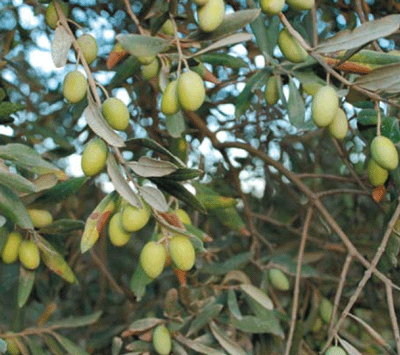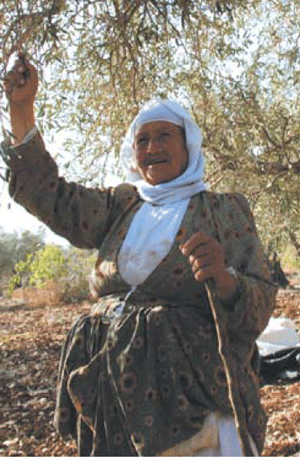Underneath much of the Middle East lies the world's oil supply, which is pumped year-round to keep the global economy humming along. In one special place in the Middle East--better known as the Holy Land--a different type of oil reigns supreme: olive oil. In this strategic region in the Levant, Palestine has a large amount of land devoted to the olive tree; about 45% of agricultural land in the occupied Palestinian territory (OPT) is planted with twelve million olive trees, the vast majority of which are in the West Bank, and its valuable, healthy fruits take center stage in the political conflict between Palestinians and Israelis every harvesting season.
Land is at the core of this conflict. Israel's military has confiscated land for illegal Israeli settlements, erected an illegal "Separation Barrier" that separates Palestinian farmers from their plantations, and has not spared Palestinian olive groves: it has uprooted olive trees as a way of punishing the population. The vast majority of Palestinian olive trees are in the West Bank, which has 739,500 dunams (184,875 acres), or 98.6% of the total, whereas, the Gaza Strip had only 11,200 dunams (2,800 acres) of olive trees, which is 1.4%. However, in the Gaza Strip, over 7,300 dunums (1,825 acres) of land along the perimeter fence with Israel, previously cultivated with olive trees, were leveled during Israeli incursions in recent years. An olive seedling can take several decades to fully mature and many of Palestine's olive trees are hundreds of years old. The horrifying reality is that Israel has added olive trees to their campaign to ethnically cleanse Palestinians and the result is that Palestine's golden oil is becoming scarcer and much more dangerous to harvest.

Photo credit: Vivien Sansour
Cultivating olive trees and harvesting this murky, tangy, golden liquid is the livelihood for approximately 100,000 Palestinian families. Olive picking is more than a seasonal chore--it is a way of life. Families tend to their olive trees all year round to harvest them in October and November. Family members, young and old, gather in the fields from early morning to sunset to share in the hard work of hand picking the olives, collecting them in large nylon bags, then hauling them to the nearest olive press to extract the valuable yield of olive oil. For the thousands of families who have harvested olives for generations, the value of land means little if not cultivated, hence the olive tree, being a lifelong investment in the land, takes on special meaning. It is not uncommon to find inheritances that distribute olive trees among descendants, thus one can understand how the Israeli destruction of trees is viewed as a direct, deliberate, and violent provocation.
Palestinian olive oil is sold locally this year for 400 NIS ($114) for a 16-kilogram jug. A recent Oxfam briefing paper, "The Road To Olive Farming," notes that "in a good year, the [Palestinian] olive oil sector contributes over $100 million of income annually to some of the poorest communities." This figure amounts to one quarter of the gross agricultural income in the OPT.
Olive oil cultivation is a core sector in Palestine's economic mix. The Oxfam paper notes that "in 2006, 21,000 tons of olive oil remained [for export] once the needs of the domestic market had been met." The global olive production industry is valued at over $10 billion; the export potential for Palestinian olives and olive oil has not even begun to be tapped.

Photo credit: Vivien Sansour
When the Israeli occupation is not making its presence felt, the season of the olive harvest is absolutely breathtaking. Unfortunately, the Israeli occupation cannot be ignored. The United Nations' Office for the Coordination of Humanitarian Affairs in the OPT issued an "Olive Harvest Factsheet" in October 2011 lists the threats facing Palestine's olive sector:
- 44 out of 66 [Separation] Barrier gates are only open during the harvest season, impeding the regular maintenance of the groves and undermining their productivity.
- Some 40% of applications for "visitor permits" to access [Palestinian] olive groves behind the Barrier, submitted by Palestinians on the eve of the 2010 harvest season, were rejected.
- In the vicinity of 55 Israeli settlements, Palestinian access to olive groves is limited to certain times during the harvest season, when Israeli forces are deployed on the ground.
- Between January and September 2011, more than 7,500 olive trees belonging to Palestinians were uprooted, set on fire or otherwise vandalized by Israeli settlers.
- Of 97 complaints about settler attacks against Palestinian trees, followed up by the Israeli NGO Yesh Din, none (zero) has so far led to the indictment of a suspect.
These facts speak for themselves. It is not enough that Israel has confiscated and illegally annexed Palestinian lands by constructing the Separation Barrier; Israel is determined to make sure that even those Palestinian lands that remain will be inaccessible for Palestinians to earn a dignified livelihood. But Palestinians are not known to give up so easily. Rural communities everywhere feel a deep attachment to their land, trees, and crops, more so than those who live in urban societies. It is this attachment that accounts in part for the Palestinian determination to carry on, focused on our right to work our lands.
The international solidarity that has been expressed by volunteers coming from all corners of the world to join in planting saplings in February and harvesting the olives in October is a tremendous source of strength. Whether you actually participate along side Palestinian farmers, buy Palestinian olives, olive oil and olive soap from anywhere in the world, or you are helping to get the word out to hold Israel accountable for its actions, together we are standing on the side of humanity in a conflict that seems to have none.
